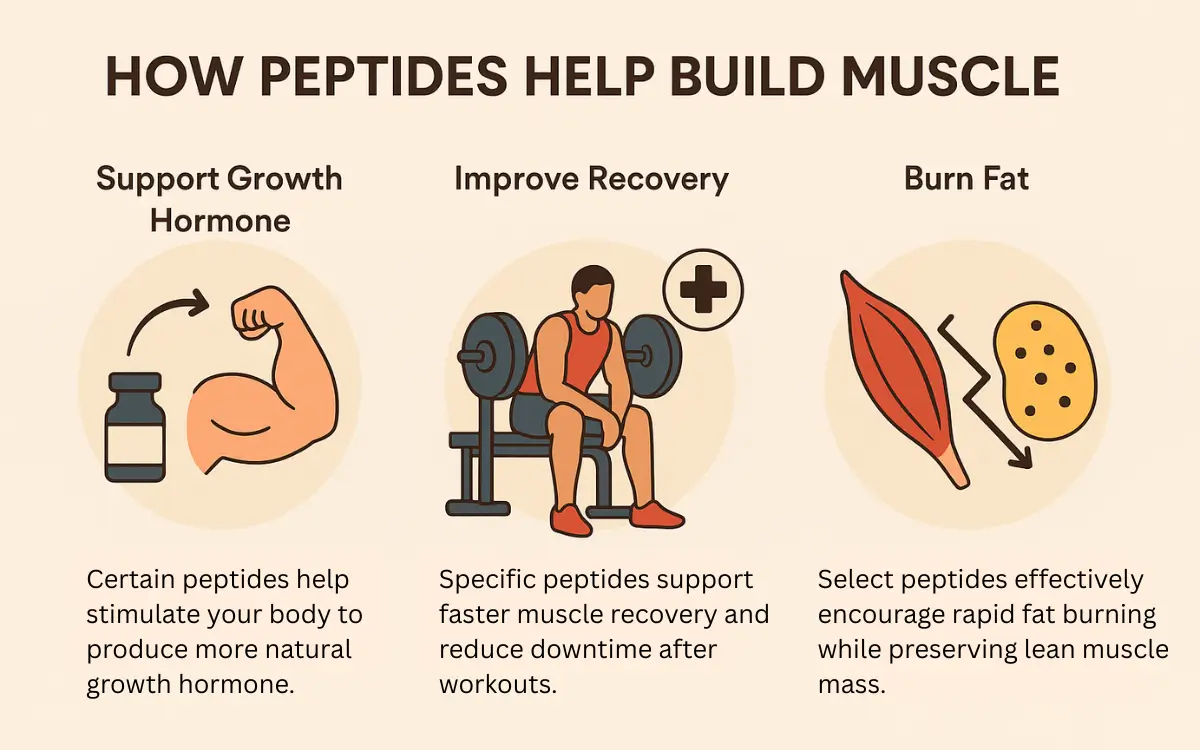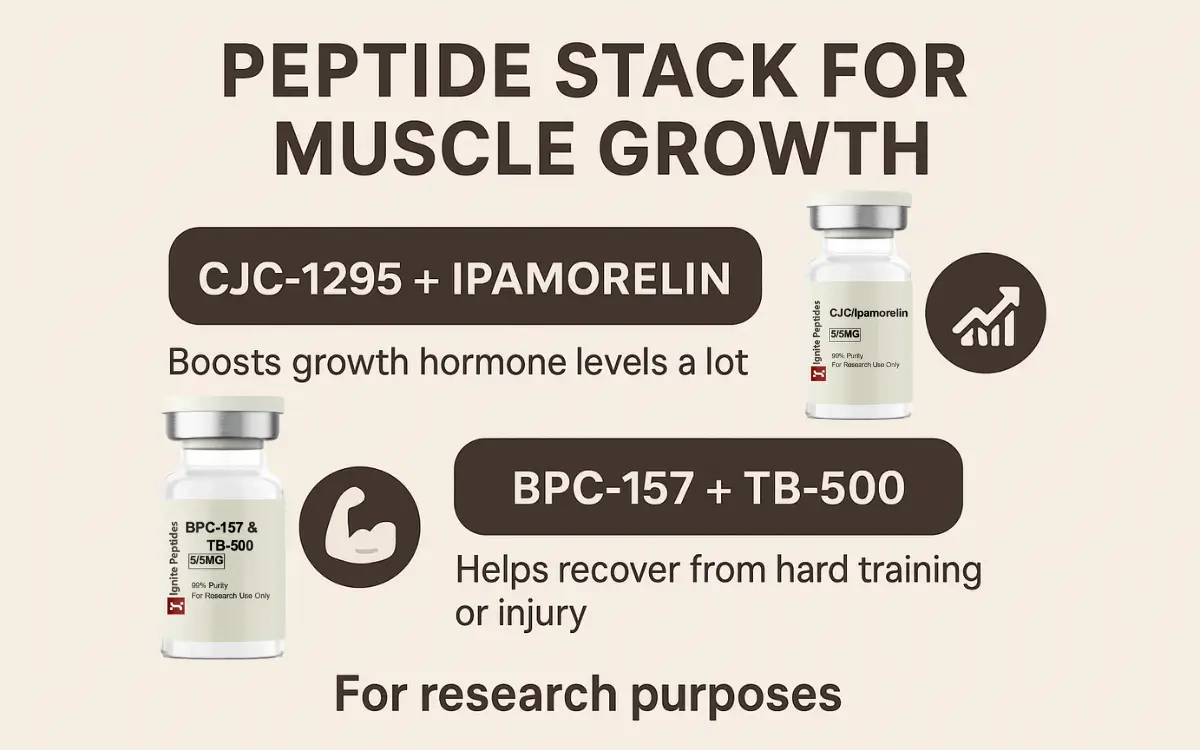Peptides for Muscle Growth: What Science Says
Peptides for building muscle are getting more popular with people who work out. These tiny proteins help build muscle, improve recovery, and increase energy. But what does science say about them? Let’s make it easy to understand.
What Are Peptides for Muscle Growth?
Peptides are short chains of amino acids. Your body naturally makes them. They act like messengers, telling your body to grow muscle, heal faster, or burn fat.
Peptides for muscle growth work by boosting your body’s growth hormone levels. Growth hormone helps build new muscle and repair damaged tissue. That’s why many bodybuilders and fitness fans use them.
Some peptides may help burn fat. They can also support strength development. Others improve sleep and reduce inflammation. Each one plays a part in improving how your body works.

How Do Peptides Help Build Muscle?
Peptides help your body in three main ways.
- Support Growth Hormone: Certain peptides signal your body to produce more of it. This leads to more muscle growth.
- Improve Recovery: Peptides help you heal faster after workouts. Faster recovery may lead to less downtime between workouts.
- Burn Fat: Some peptides help your body burn fat while keeping your muscles.
Peptides for muscle growth are not magic. Using them with good nutrition gives better outcomes. Regular exercise helps, too.
Peptides are especially useful when you’re trying to break through a workout plateau. They can give your body that extra push to grow muscle faster and recover more efficiently.
Best Peptides for Muscle Growth
There are many muscle-building peptides. These are some of the best-known and most used ones.
CJC-1295
CJC-1295 increases growth hormone levels. It can help build lean muscle and improve sleep. Many people combine it with Ipamorelin to see better effects.
Ipamorelin
This Ipamorelin peptide boosts growth hormone with fewer side effects. It’s great for beginners. It doesn’t raise cortisol, which means less stress on your body.
BPC-157
BPC-157 is known for healing. It helps repair muscles, tendons, and joints. Some athletes use it during recovery. It may help after injuries or heavy workouts.
Sermorelin
Sermorelin also increases growth hormone. It acts gradually over time. Many researchers study it for anti-ageing effects. It’s a good starting point for those new to peptide therapy.
Tesamorelin
This peptide may reduce belly fat. It can also improve muscle tone. It is often used by people looking to shape their bodies and lose stubborn fat.
These are the best peptides for muscle growth, but not all work the same for everyone. Your body might react well to one peptide. Another may not produce the same results.

Peptide Stack for Muscle Growth
Peptide stacking means combining two or more peptides. This can give better results.
Example Stack:
- CJC-1295 + Ipamorelin: Boosts growth hormone levels a lot.
- BPC-157 + TB-500: Helps recover from hard training or injury.
Some users also add GHRP-6 or GHRP-2. These peptides stimulate appetite, which can help people gain weight and build muscle.
Before using a peptide stack for muscle growth, talk to a doctor or medical expert. Each person’s body is different. One peptide may work well for one person. Each person responds differently. One peptide might help someone, but not everyone. Stacking peptides without proper knowledge can be risky. It may cause side effects.
Are Peptides Safe and Legal?
Peptides for muscle growth can be safe if used the right way. But there are risks:
- Hormone imbalance
- Water retention
- Tiredness
- Headaches
- Joint pain
Use the correct dose and talk to a doctor. Some peptides are only legal with a prescription. In many places, they are only legal if a doctor gives them to you.
Avoid buying from unknown websites. Only buy peptides from trusted, tested sources. This helps ensure purity, safety, and the best results.
Where to Buy Peptides for Muscle Growth
Look for medical clinics or licensed online pharmacies. Make sure they offer lab-tested products.
Warning: Cheap or fake peptides can be dangerous. To be safe, get your peptides from a reliable seller.
You can also look for clinics that specialise in hormone therapy. Many of them provide medical-grade peptides.
If you’re serious about muscle growth, it’s better to work with a doctor or wellness clinic. They’ll help you follow a plan that’s right and safe for you.
Lifestyle Tips to Boost Peptide Results
Peptides work better when paired with healthy habits. Here are a few tips:
- Eat enough protein daily
- Get 7-8 hours of sleep
- Do resistance training 3-5 times a week
- Stay hydrated
- Avoid alcohol and junk food
- Add stretching or yoga to stay flexible
- Track your progress weekly
These easy habits make peptides work better and faster. Your lifestyle choices matter just as much as the peptides you take.
Final Thoughts
Peptides for muscle growth are exciting. They help you build muscle, recover faster, and improve your workouts. But they are not for everyone.
Talk to a doctor before you use any. Make sure the option you pick is safe and legal to use.
With the right plan, peptides for muscle growth can take your fitness to the next level. Use them smartly and stay healthy.
FAQs About Muscle Peptides
What are peptides in bodybuilding?
Peptides are natural compounds that boost growth hormones to help build muscle.
Which peptide is best for lean muscle gain?
Both CJC-1295 and Ipamorelin are widely used to enhance lean muscle mass.
How fast do peptides work for muscle growth?
It may take 4 to 12 weeks to see clear results.
Can peptides replace steroids?
Peptides are safer and more natural. Peptides are milder than steroids. They aren’t as strong or intense.
Are peptides safe for long-term use?
Some peptides are safe to use long-term if a doctor says it’s okay. Always monitor your health.
Reference
- WebMD. (n.d.). What Are Peptides?. Retrieved May 27, 2025, from https://www.webmd.com/a-to-z-guides/what-are-peptides
- Healthline. (2021, May 30). Peptides for Bodybuilding: Do They Work, and Are They Safe?. Retrieved May 27, 2025, from https://www.healthline.com/nutrition/peptides-for-bodybuilding
- Alekseeva, T., Sidorova, Y., Krasilnikova, O., & Pishel, I. (2021). Peptides in the Management of Sarcopenia and Frailty—A Narrative Review. International Journal of Molecular Sciences, 22(21), 11713. https://doi.org/10.3390/ijms222111713
Retrieved from https://www.ncbi.nlm.nih.gov/pmc/articles/PMC8622853
